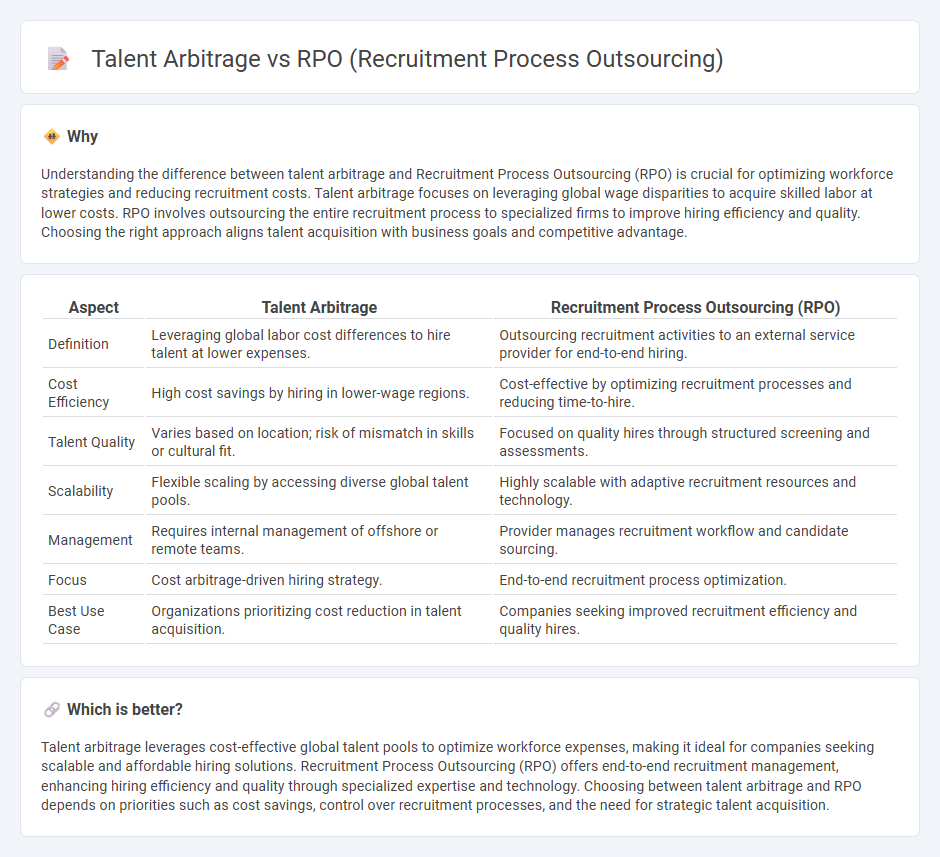
Talent arbitrage leverages global workforce cost differentials to optimize hiring expenses, whereas Recruitment Process Outsourcing (RPO) delegates entire or partial recruitment functions to external specialists, enhancing process efficiency and candidate quality. Both strategies address talent acquisition challenges but differ in scope, control, and operational integration within organizations. Discover how these approaches can transform your hiring strategy and maximize workforce value.
Why it is important
Understanding the difference between talent arbitrage and Recruitment Process Outsourcing (RPO) is crucial for optimizing workforce strategies and reducing recruitment costs. Talent arbitrage focuses on leveraging global wage disparities to acquire skilled labor at lower costs. RPO involves outsourcing the entire recruitment process to specialized firms to improve hiring efficiency and quality. Choosing the right approach aligns talent acquisition with business goals and competitive advantage.
Comparison Table
| Aspect | Talent Arbitrage | Recruitment Process Outsourcing (RPO) |
|---|---|---|
| Definition | Leveraging global labor cost differences to hire talent at lower expenses. | Outsourcing recruitment activities to an external service provider for end-to-end hiring. |
| Cost Efficiency | High cost savings by hiring in lower-wage regions. | Cost-effective by optimizing recruitment processes and reducing time-to-hire. |
| Talent Quality | Varies based on location; risk of mismatch in skills or cultural fit. | Focused on quality hires through structured screening and assessments. |
| Scalability | Flexible scaling by accessing diverse global talent pools. | Highly scalable with adaptive recruitment resources and technology. |
| Management | Requires internal management of offshore or remote teams. | Provider manages recruitment workflow and candidate sourcing. |
| Focus | Cost arbitrage-driven hiring strategy. | End-to-end recruitment process optimization. |
| Best Use Case | Organizations prioritizing cost reduction in talent acquisition. | Companies seeking improved recruitment efficiency and quality hires. |
Which is better?
Talent arbitrage leverages cost-effective global talent pools to optimize workforce expenses, making it ideal for companies seeking scalable and affordable hiring solutions. Recruitment Process Outsourcing (RPO) offers end-to-end recruitment management, enhancing hiring efficiency and quality through specialized expertise and technology. Choosing between talent arbitrage and RPO depends on priorities such as cost savings, control over recruitment processes, and the need for strategic talent acquisition.
Connection
Talent arbitrage leverages geographical salary differences to source skilled employees cost-effectively across global markets. Recruitment Process Outsourcing (RPO) streamlines hiring by managing recruitment functions externally, often capitalizing on talent arbitrage to access diverse talent pools. Combining RPO with talent arbitrage enables companies to optimize workforce quality while reducing recruitment expenses and accelerating time-to-hire.
Key Terms
Vendor Management
Recruitment Process Outsourcing (RPO) centers on enhancing vendor management through strategic partnerships that streamline talent acquisition, optimize recruitment workflows, and ensure compliance with regulatory standards. Talent arbitrage emphasizes leveraging cost differentials by sourcing skilled labor from diverse geographic markets, often challenging vendor collaboration due to varying quality and communication barriers. Explore how advanced vendor management techniques can bridge these approaches for improved recruitment efficiency and competitive advantage.
Cost Efficiency
RPO (Recruitment Process Outsourcing) streamlines hiring by leveraging specialized vendor expertise to reduce recruitment costs and improve talent acquisition efficiency. Talent arbitrage focuses on cost savings by outsourcing roles to lower-wage regions without necessarily enhancing recruitment quality or process integration. Explore in-depth comparisons to understand which approach maximizes cost efficiency for your organization's talent strategy.
Talent Quality
Recruitment Process Outsourcing (RPO) leverages specialized expertise and scalable resources to enhance talent quality by streamlining hiring processes and ensuring candidate alignment with organizational needs. Talent arbitrage, often centered on cost efficiency, may compromise on quality by prioritizing lower labor costs over skill proficiency and cultural fit. Explore the strategic benefits and impacts of RPO versus talent arbitrage on workforce excellence to make informed hiring decisions.
Source and External Links
What is Recruitment Process Outsourcing? - Hudson RPO - Recruitment Process Outsourcing (RPO) is a business model where a company outsources all or part of its recruitment function to a third-party specialist to improve cost, quality, efficiency, service, and scalability in talent acquisition, managing the end-to-end recruitment process from sourcing to onboarding.
Top 7 benefits of RPO recruitment - Safeguard Global - RPO providers act as an internal recruitment team handling the entire hiring process including sourcing, screening, interviewing, background checks, offers, and onboarding, offering enhanced efficiency, expertise, faster time-to-fill, and improved quality of hires through specialized teams and advanced recruitment technologies.
What is Recruitment Process Outsourcing (RPO)? - RPO is a form of business process outsourcing where an employer transfers recruitment responsibilities to an external service provider who assumes ownership of recruitment design, process management, and results, differing from traditional staffing or search firms.
 dowidth.com
dowidth.com